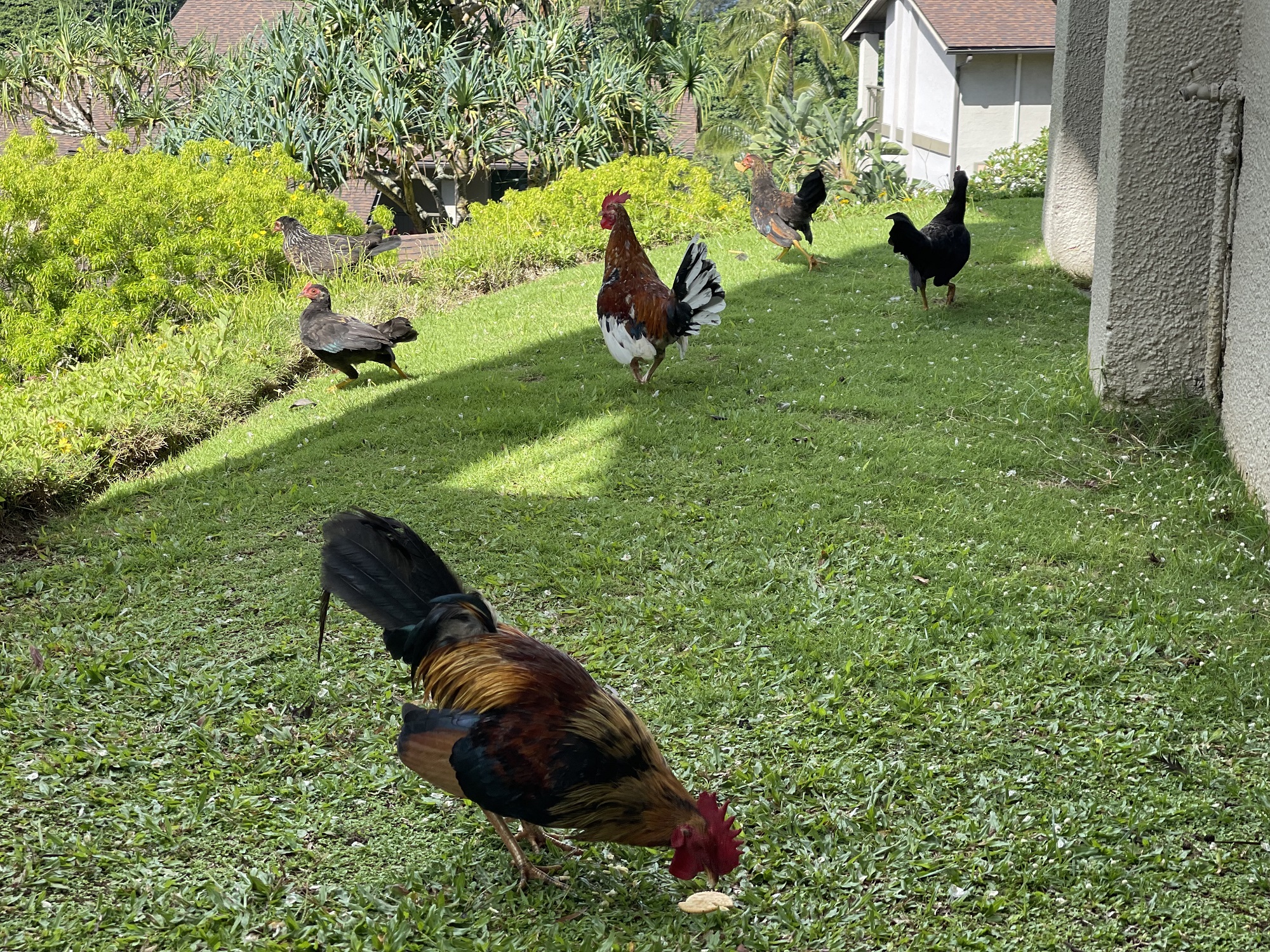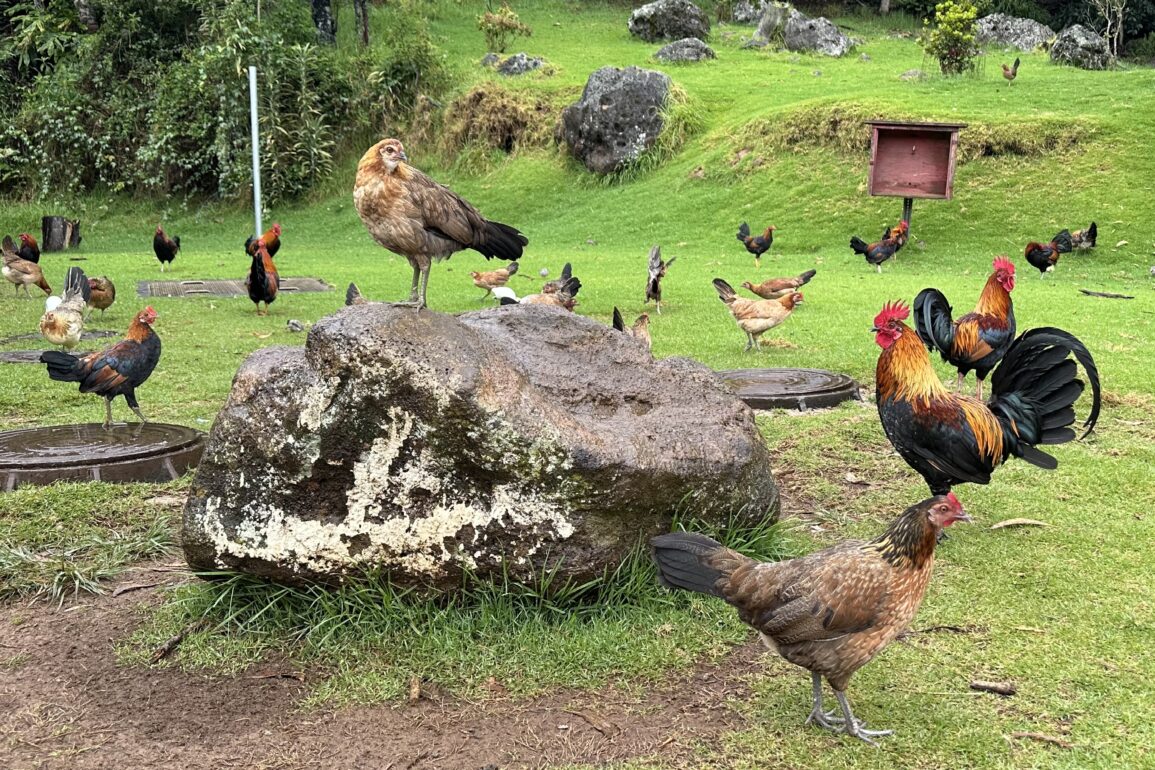New law requires the Department of Agriculture to work with each county in Hawaii to implement feral chicken control programs and a feeding of feral animals education campaign.
Hawaii, renowned for its natural beauty and diverse wildlife, faces a unique challenge with its feral chicken population. To address the issue, Hawaii passed a law (text below) in July 2024 designed to control the population of feral chickens and roosters and educate people about the pitfalls of feeding feral chickens.
Feral chickens, believed to have descended from domesticated birds brought to the islands by Polynesian settlers centuries ago, have thrived in Hawaii’s warm climate and abundant food sources. Over the years, these chickens have multiplied rapidly and become a common sight across the islands, especially on Kauai. While many residents and visitors appreciate the picturesque scenes created by these birds, their unchecked population growth has raised concerns.
Feral chickens are known to cause disturbances in residential areas, crowding public spaces, and creating noise pollution with their characteristic crowing at all hours. Additionally, they pose health risks by potentially spreading diseases to both humans and domestic poultry. Their presence also intersects with agriculture, as they can damage crops and interfere with farming activities. In urban Honolulu, the burgeoning chicken population has become problematic on many fronts.
In response to these concerns, Hawaii’s legislators introduced SB2401, aimed at regulating the feral chicken population across the state. The bill, passed into law on July 1st, 2024, outlines several measures to effectively manage and control these birds. The measures include allocating funds to each county in Hawaii for feral chicken control programs, and for the counties to match those funds.
Kauai, often referred to as the “Garden Isle,” is renowned for its stunning natural beauty and the unique presence of feral chickens roaming freely across its landscapes. The Kauai Chickens, in particular, have become a beloved symbol of the island’s charm, drawing tourists and photographers alike to capture their vibrant colors against the backdrop of lush greenery and pristine beaches. There’s even a Kauai Chickens store on Kauai, with t-shirts, hats and more featuring Kauai’s birds of paradise.
Local stakeholders, including residents and community leaders, have expressed mixed reactions to the law. Some support the measures as necessary for managing the feral chicken population’s impact on local ecosystems and agriculture. Others are concerned about the potential disruption to Kauai’s unique character and tourism appeal.

Feral Chickens at Hanalei Bay Resort
Here at Kauai Magazine, we love the inherent charm the Kauai Chickens add to the experience of the Garden Isle, while recognizing that not everyone on Kauai appreciates their unending presence. In recent years, we’ve noticed some island resorts, in response to guest complaints about unwelcome early morning wake up calls by the chickens, have made progress in controlling feral chicken populations on their resort properties. While that is understandable, we’re hoping the new law doesn’t put too much of a dent in the local chicken population.
###
A BILL FOR AN ACT
RELATING TO FERAL CHICKENS.
BE IT ENACTED BY THE LEGISLATURE OF THE STATE OF HAWAII:
SECTION 1. The legislature finds that feral chickens and roosters have become a persistent nuisance, particularly in suburban and urban residential communities. Feral chickens and roosters wander into yards and gardens, digging up plants, damaging food crops, and jeopardizing native plants and resources. Feral roosters crow at all times of the day and night, which has led to numerous noise complaints by residents throughout the State, and droppings from feral chickens are unsanitary and create a health concern.
The legislature further finds that feral chickens and roosters also carry diseases that threaten other animals, including native birds, and a noticeable increase in the number of feral chickens and roosters also creates a road hazard for drivers who must suddenly stop or swerve to avoid them. The legislature further finds that residents and visitors need better education to not exacerbate this problem by feeding feral animals, which leads to further congregation and growth of the nuisance. To protect Hawaii’s ecosystem and natural resources and the health and safety of its residents, it is critical that the State work together with the counties to identify and implement collaborative solutions to control the significant increase in the population of feral chickens and roosters.
Accordingly, the purpose of this Act is to:
(1) Require the department of agriculture to work with each county to implement feral chicken control programs and feeding of feral animals education campaigns; and
(2) Require each county to match the funds expended by the department of agriculture for the implementation of the feral chicken control program and feeding of feral animals education campaign in that county.
SECTION 2. (a) The department of agriculture shall work with each county to implement feral chicken control programs and feeding of feral animals education campaigns in each county.
(b) Each county shall provide one hundred per cent of matching funds for the amount of funds expended by the department of agriculture for the implementation of the feral chicken control program and feeding of feral animal education campaign in that county.
SECTION 3. This Act shall take effect on July 1, 2024.


